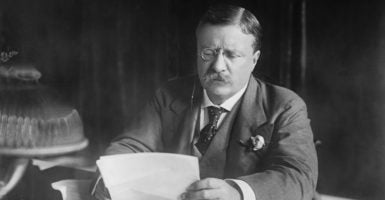Today marks the 115th anniversary of the swearing-in of Theodore Roosevelt, who would turn out to be our first progressive president.
Roosevelt was thrust suddenly into that high office after the assassination of President William McKinley on Sept. 14, 1901.
On that somber September day, it was not yet clear what shape TR’s political trajectory would take. But before he left office, he would win a reputation as both an advocate of American greatness and a progressive reformer.
The United States was a rising great power 115 years ago, and Roosevelt did his best to accelerate that ascent. He was a staunch believer in military preparedness and threw his energies into building up American naval power.
By the time he left office in 1909, the Great White Fleet had been around the world and was second only to Britain’s naval forces. For TR, American greatness depended on the projection of a great U.S. Navy.
But for all his efforts to build up military might, Roosevelt for the most part pursued prudent foreign policies while president. He won the Nobel Peace Prize for his mediation in ending the Russo-Japanese War and kept America out of war during his time in the White House.
He popularized an African proverb, “Speak softly, and carry a big stick,” which he generally adhered to in foreign policy—but not at all in domestic differences. Roosevelt was the master of the political putdown, hurling colorful insults at his opponents.
For TR, national greatness also had a domestic component. Most people associate this with his support of national parks and conservation, but there was also an economic dimension. It is well to remember that the Republican Party of McKinley’s and Roosevelt’s day was not the party of laissez-faire and easy money, but of tariffs and a strong currency. These positions once again are being debated and sparking controversy among Republicans.
At the same time, Roosevelt railed against purely commercial ideals, which he regarded as “sordid” and “mean.” Aspiring statesmen, he declared in his inaugural address of 1905, should be animated by “lofty ideals” that would speak not only to “the things of the body,” but also to “the things of the soul.”
Especially after his landslide election to a full term as president in 1904, he moved further to the left, supporting top-down regulatory policies and greater economic redistribution—a feature of his legacy that animates the left to this day.
Roosevelt also welcomed immigrants from Southern and Eastern Europe, provided they assimilated rapidly to the American way of life, including learning English. If they failed to learn the language within five years, he thought they should be deported.
He railed against the hyphenated American, who celebrated the holidays and traditions of the old country. Americans, he thought, should celebrate Thanksgiving and the Fourth of July, not St. Patrick’s Day or other ethnic feasts.
He opposed multiculturalism “avant la lettre,” meaning before the term was coined. Assimilation was key to a successful immigration policy, and those that could not do so would have to leave.
TR would go on to lay the foundation for the administrative state by regulating railroad rates and fight (unsuccessfully) to extend bureaucratic control over the entire industrial economy. He also would call for the appointment of Supreme Court justices who shared his progressive views, and assert his own expansive view of executive power, unmoored from the Constitution.
TR’s legacy is mixed. While the first advocate for “American greatness” laid down the roots for our world-class military, many of his progressive reforms haunt us to this day.

































One Reply to “Theodore Roosevelt and the Pursuit of American Greatness”